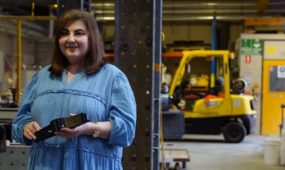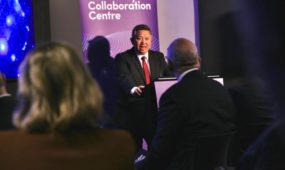South Australia's brightest young researchers honoured by Tall Poppy Awards
Research & Development
THE best young researchers in fields as diverse as particle physics, biological conservation and pain perception were honoured last night at the 2015 South Australian Young Tall Poppy Science Awards.

Sign up to receive notifications about new stories in this category.
Thank you for subscribing to story notifications.
THE best young researchers in fields as diverse as particle physics, biological conservation and pain perception were honoured last night at the 2015 South Australian Young Tall Poppy Science Awards.
Presentation of the 2015 Tall Poppy of the Year Award will take place as part of the South Australian Science Excellence Awards Gala Dinner held at the Adelaide Convention Centre on Thursday the 13th of August.
2015 TALL POPPY AWARD WINNERS
From The University of South Australia
Dr Tasha Stanton, School of Health Sciences – Research Field: Pain
Pain is frustratingly complex. Dr Stanton’s research has determined that people with chronic pain often have changes in the way their body feels to them caused by changes in perception of how the brain “codes” for that body part. Using visual illusions, Dr Stanton’s team can change how the body looks to a person (to make it look bigger or smaller) and by changing how the painful body part looks reduces the pain experienced in osteoarthritis suffers. Her innovation in this area stands to trigger a new field of research into novel exploitation of brain-based mechanisms to induce analgesia and promote function.
Dr Stanton is the section editor for the BodyinMind website. She has been involved in numerous public lectures, both nationally and internationally, to improve public knowledge about the brain’s role in pain and new brain-based treatments.
From THE UNIVERSITY OF ADELAIDE
Dr Suzanne Mashtoub, Gastroenterology Department, The Women’s and Children’s Hospital – Research Field: Medical Science
Intestinal inflammatory conditions have been at the forefront of medical research due to lack of effective treatment options. These conditions include ulcerative colitis (large intestinal damage), non-steroidal anti-inflammatory drug enteropathy (small intestinal damage) and mucositis (cancer drugs causing damage to normal cells of the digestive tract). Dr Mashtoub’s research is looking into the use of Emu Oil, extracted from Emu fat and first used by Indigenous Australians to provide relief from pain, promote wound healing and to treat inflamed joints, as a suitable treatment option for intestinal inflammatory digestive conditions.
Dr Martin White, Department of Physics – Research Field: Particle Physics
As a theorist, Dr White has developed new techniques for identifying the correct explanation of dark matter, what the universe is made of and how it evolved from a tiny point to its current state. Dr White has also been a member of the ATLAS collaboration of the Large Hadron Collider. The results of his research will give us the most detailed possible answer of how the universe came to be.
Since 2011, Dr White has been involved in the “Science of Fiction: Dr Who” as co-writer and co-star of the 90 minute show on the science behind the popular BBC TV series.
Dr Martin Breed, Department of Ecology & Environmental Science – Research Field: Conservation & Restoration Biology
Dr Breed’s research interests are in developing conservation & restoration solutions from studying plant adaptation and community ecology, which plants to use, where to collect quality seeds and how to efficiently track success of restoration projects. More restoration in society will increase ecosystem services, therefore increasing land value plus improved pollination and more productive home gardens and agriculture.
Dr Renee Turner, Department of Anatomy & Pathology – Research Field: Neuroscience
Brain swelling (cerebral oedema) and elevated intracranial pressure are life-threatening compilations of stroke and occur as a result of blood-brain barrier dysfunction. These complications are associated with significant death and disability. Dr Turner has identified a drug that prevents the brain from swelling, a treatment that greatly improves survival and outcome following stroke.
Dr Caitlin Byrt, School of Agriculture, Food & Wine – Research Field: Plant Science
Plants supply us with food, fibre and fuels. Unfortunately the world’s population is increasing, with greater demand for plant products but the resources needed to grow crop plants, such as productive land and water, are in decline. Dr Byrt’s research involves using biotechnology to improve plants productivity for food and fuel industries, increasing yield and quality of products. It also involves the examination of how plants control the composition of their biomass and develop strategies for making environmentally friendly and sustainable biofuels.
Dr Melissa Cantley, School of Medical Sciences & the South Australian Health & Medical Research Institute – Research Field: Bone Loss Diseases
In healthy states, there is a balance between the processes of bone degradation and bone formation/deposition so that our bone mass remains constant. However, in a number of disease states there is an imbalance with too much bone being lost making the bones weak. This bone loss occurs in a number of inflammatory diseases including the common gum disease periodontitis, rheumatoid arthritis and also malignant diseases such as blood cancer and multiple myeloma. Dr Cantley’s research focuses on new drug treatments directed towards halting this bone loss & improving bone quality in patients affected by these diseases.
From SA Health
Ms Kristin Carson, The Queen Elizabeth Hospital – Research Field: Translational Research, Respiratory Medicine
Almost half of all Indigenous Australians aged 14 years and over are reporting smoking on a daily basis compared to 21% of non-Indigenous Australians. Ms Carson’s research has found significant shortcomings in the evaluations of existing tobacco programs intended to reduce tobacco use in Indigenous populations. Her research uses the Cochrane Tobacco Addiction Group’s specialist register, electronic databases and bibliographies to evaluate controlled trials and programs in this population.
In 2014, Ms Carson was awarded the Premier’s Channel 9 Young Achiever of the Year and is currently South Australia’s Young Australian of the Year.
Dr Simon Conn, Centre for Cancer Biology – Research Field: Cancer Biology
Cancer metastasis is responsible for over 90% of cancer-related death and involves a complex reprogramming of gene expression, whereby relatively immobile cancer cells adopt a more invasive phenotype and move to a secondary site in the body, away from the original tumour. Dr Conn has discovered that novel pieces of genetic information, called circular RNAs, are present at much higher levels in human metastatic cells and represent potential new targets for cancer therapy.
Jump to next article



